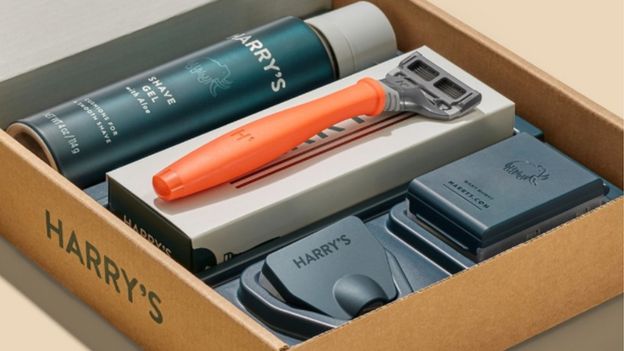Shaving firm Harry’s, formed just six years ago, has been bought by the owner of Wilkinson Sword for $1.37bn (£1bn).
Harry’s has helped to shake up the men’s grooming market by selling goods direct to consumers via subscription.
The founders, Andy Katz-Mayfield and Jeff Raider, will join buyer Edgewell Personal Care as co-presidents.
Such start-ups have transformed the decades-old razor sector, prompting Unilever’s purchase of Harry’s rival Dollar Shave Club in 2016 for $1bn.
Harry’s sells men’s razors, as well as face washes, lotions and women’s products under its Flamingo line, over the internet, with customers signing up to a certain number of blades each month.
Market shake-up
The founders, both in their early 30s with a background in private equity, say they formed Harry’s because existing razors were too expensive and overdesigned.
They built the company rapidly, with such initiatives as a collaboration with upmarket clothing retailer J. Crew and using brand ambassadors such as England football captain Harry Kane.
The firm started selling its products in the UK in 2017.
New York-based Harry’s has also invested in other businesses, including Hims, which sells hair-loss prevention products.
Harry’s has captured about 2% of the $2.8bn men’s shaving industry since its founding in 2013, according to market research firm Euromonitor.
In a report on the shaving sector published last year, Euromonitor said firms such as Harry’s had been able to shake up the market by creating one-to-one brand relationships with consumers.
Simple solution
Young consumers “prefer brands offering a simple solution in a transparent way, look for brands to be identified with, seek convenience, and rely more than ever on friends, family, and influencers’ recommendations”, Euromonitor said.
Whereas the major razor brands that dominated the market for decades marketed their products’ technology, new consumers “look for a solution, not features”, according to Euromonitor.
The global men’s grooming industry is expected to hit $78.6bn by 2023, from $57.7bn in 2017, according to a ResearchAndMarkets.com report.
Consumer goods giants such as Unilever and Procter & Gamble have put much more focus on men’s grooming, trying to coax them into spending more on deodorants, skin creams and hair products.
Such was the success of firms such as Harry’s that the biggest brand, Gillette, launched its own online subscription rival.
Under the Harry’s purchase, Edgewell will pay 79% of the deal value in cash and the rest in shares, giving Harry’s shareholders an 11% stake in the combined company on completion of the deal.


